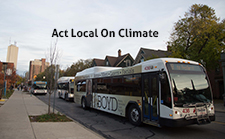Beyond Carbon Neutral Seminar Series: Biofuels vs. Biodiversity and the Need to Think Beyond Carbon Neutral
Speaker: John DeCicco, University of Michigan Energy Institute
Location: Kuenzel Room at the Michigan Union
Abstract: Just over a decade ago, the United States gave a big boost to biofuels with a major expansion of the Renewable Fuel Standard (RFS). Similar efforts were made in California through its Low-Carbon Fuel Standard (LCFS) and as part of the European Union's Renewable Energy Directive (RED). All of these policies had sustainability provisions written into them for protecting sensitive lands. The plans, championed by some leading green groups, were designed to spur the production of advanced biofuels that would be sustainable in terms of multiple factors including very low CO2 emissions. Now, new studies appear each year documenting the destruction of forests, grasslands and other diverse habitats as biofuel use accelerates the demand for productive land beyond what is needed to meet growing global food demand. This same period has seen many bankruptcies of highly-subsidized advanced biofuel operations. What went wrong? Why did such well-intended plans so quickly go so far awry? And how can we find a better path forward, especially for mitigating the still growing share of CO2 emitted from the liquid fuels on which transportation sectors around the world largely depend?
To answer these questions, this talk will synthesize findings from the recent literature, including the speaker's own papers, remote sensing studies and other reports that have assessed the impacts of biofuel production on land use and biodiversity. The talk will recount the history of this aspect of energy policy, examining the assumptions made in the literature that underpins established renewable fuel strategies, and re-evaluating them in light of ecological and economic realities. It will point out how mistakes might have been avoided if researchers and policy advocates had been more attentive to terrestrial ecology and the carbon cycle. A simple stock-and-flow model reveals the crucial role that increasing the rate of net carbon uptake (net ecosystem production, NEP) plays for any form of bio-based climate mitigation. This insight underscores the importance of "Thinking Beyond Carbon Neutral," which in this context means properly valuing the crucial ecosystem service of absorbing atmospheric CO2 that biologically rich lands provide. These insights can be related to environmental economics, notably, the role of putting a price on carbon and the need to do so uniformly, so that terrestrial carbon stocks are properly valued and all CO2 emissions are priced regardless of their origin.
Bio: John M. DeCicco, Ph.D., is a research professor at the University of Michigan Energy Institute, where he addresses energy and environmental challenges through an interdisciplinary approach anchored in physical science while using insights from economics, other social sciences and public policy. Having examined a range of energy-related topics over the years, his main focus is now on transportation and its unique climate mitigation challenges. DeCicco's studies of vehicle efficiency were instrumental in the development of automotive GHG emissions and fuel economy standards. His recent research includes pioneering methodological work on CO2 mitigation for liquid fuels, and he also performs applied research on consumer perceptions and behavior. DeCicco co-founded the Beyond Carbon Neutral initiative, directs the University of Michigan Energy Survey and serves on the management committee for the university's Mcity research center on automated vehicles. Before returning to academia in 2009, he spent over twenty years working on energy policy at nonprofit organizations, including the Environmental Defense Fund and American Council for an Energy-Efficient Economy. He has testified multiple times before Congress and has more than 150 published papers, reports and formal public comments to his credit. DeCicco holds a Ph.D. in mechanical engineering from Princeton University and conducted research at its Center for Energy and Environmental Studies.














